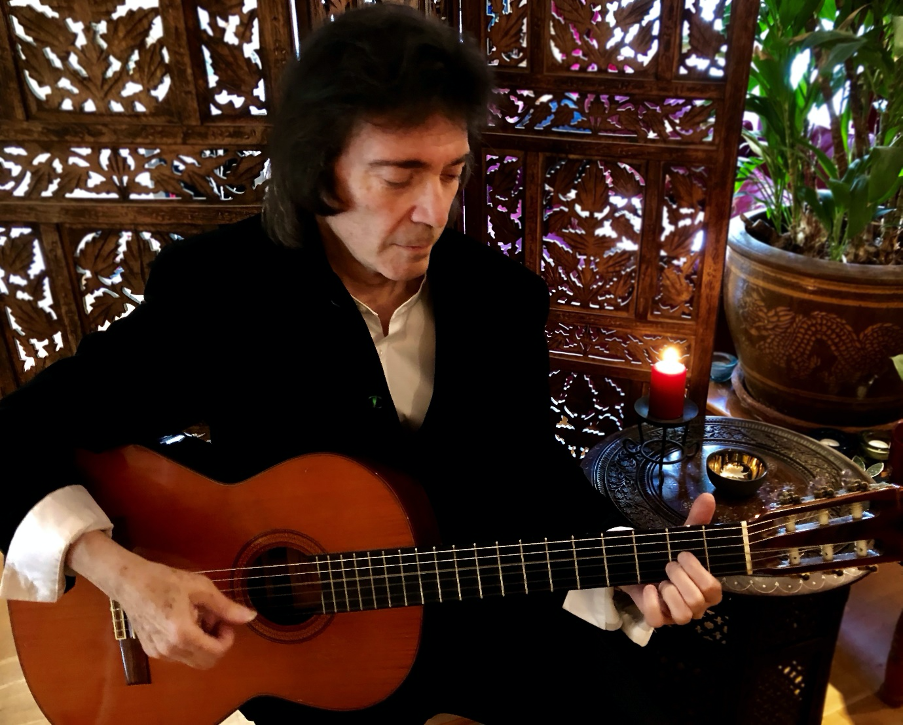INTERVIEW: In divided times, Steve Hackett believes art can bring people together

Steve Hackett, courtesy.
Like so many people around the world, Steve Hackett is not happy with how things are going. Speaking from his London home, he was clear about his disgust for what’s happening around the world and in his country, specifically.
“England is suffering from Brexit. It’s affecting everything. It’s all going horribly wrong,” he said. “And yet we have a government who aren’t really owning up to their responsibilities. We probably have the worst deaths in the world right now and Brexit affecting the rollout of vaccines. We have incompetent leadership. I think we could all do better.”
Unlike most of us, however, he has an idea of how to help. Hackett believes that art can bring people together, and the legendary Genesis guitarist has both the talent and the connections to do his part in that effort.
Hackett’s recently released acoustic orchestral album, Under a Mediterranean Sky, aims in part to do just that. Due to the pandemic, he had to collaborate with the other artists on his album remotely, but that gave him the opportunity to broaden his geographic range.
“We’ve got two people on the album, Arsen Petrosyan from Armenia, Malik Mansurov from Azerbaijan,” Hackett said. “As I was putting together the track that they’re both on, their two nations were at war with each other. But art seems to be able to do something that politicians are unable or unwilling to do.”
But that’s not the only goal of the album. While Hackett said it’s been a very productive lockdown—using the time to release both Under a Mediterranean Sky and a live album, release an autobiography and write and record music for future projects—there are still things he misses, and travel is at the top of the list.
“With this album, I thought we would do a virtual visit to the Mediterranean,” he said. “What’s attracted people to it is the idea of being able to do a virtual sojourn when we’re in the midst of this awful pandemic and various forms of lockdown.”
He also took a direct role in developing the album’s sound. While guitar remains his primary instrument—nylon-stringed for this album—he also plays other stringed instruments. On this album, those include the oud, a Middle Eastern instrument similar to a lute, and the charango, an Andean spinoff of the classical Spanish guitar.
While Hackett doesn’t consider himself an expert in any of the guitar’s ancestors and variants, his interest stems from his respect for the genesis of the guitar as a product of a global evolution. He’s quick to give a history lesson on his instrument.
“On this album, Mansurov plays the tar. It’s the same family, the word and the instrument, as the guitar and the sitar,” he said. “Before that, the ancient Greeks had the cithara. So rock and roll has to thank the Greeks, really. They invented the forerunner of the guitar. All these instruments are linked. If I’d been around in ancient Greece I probably would have been playing that.”
All this focus on ancient proto-guitars and acoustic instruments from around the world— let alone several well-regarded acoustic albums—may seem strange for a musician whose big break came with progressive rock pioneer Genesis. As Hackett explains, he’s drawn to talented people putting their personal touch onto the music. Even with digital or programatic music, of which he’s no stranger, he appreciates the human element.
“I don’t have any prejudice against programming as such; we even used it on this album. I’ve loved the sounds that come from sampling,” he said. “I just tend to struggle with the stuff that gets into a sequence and doesn’t change very much. It ceases to become surprising without the input of creative humans, whether they’re playing it or programming it. It’s not enough for someone to just come up with a drum pattern, go off and make some tea, then come back expecting everyone to still be dancing.”
It all goes back to Hackett’s point about art being one of the keys to bringing people together. Acoustic and electronic, old and new, Eastern and Western—everything can be bridged by artists coming together and sharing their vision and talent.
“It’s wonderful to be doing something constructive, to show that people can work together,” he said. “Art is the only thing we can really affect at the moment. Anything else we’re in the lap of, not the gods, but the incompetence.”
